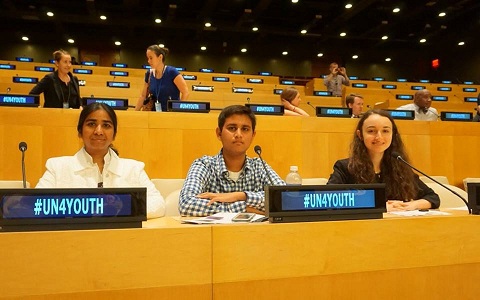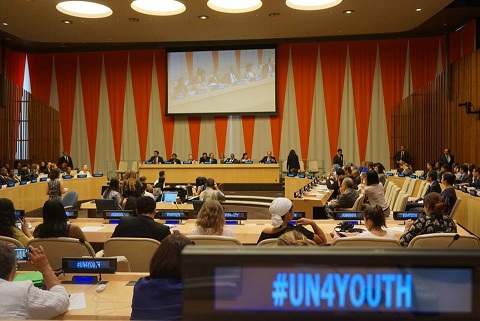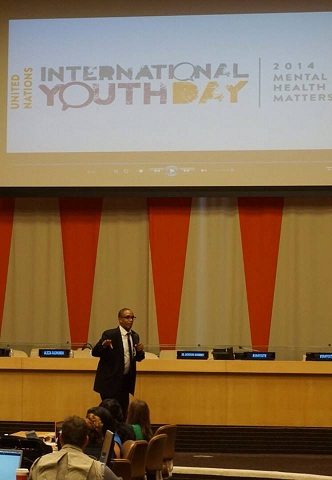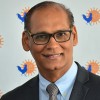
On August 12, 2014, The United Nations International Day of Youth event was held at the ECOSCO Chamber, United Nations Headquarters, New York. To commemorate the Day, Madhavi Patale, Gal Zeidman, and Dylan Murarka attended the event on behalf of the Brahma Kumaris. The theme of the day was “Youth and Mental Health” under the slogan ‘Mental Health Matters’. The three young people were present to learn about the UN’s perspective on the whole concept of mental health of youth. They were also drawn to the event due to recognizing how the solution to this growing issue begins with a reflective practice of going deep within, experiencing the latent values, and potential of the self which creates a life of unparalleled strength, self-esteem, happiness, and appreciation. The world often battles situations through external approaches and forces; but to improve mental health, a personal and internal process is required that will make lasting changes.
Here are some highlights of the event:
Discovering My Inner Superhero

Imagine being spider man — wearing one mask in the day and taking it off at night. Exhausting, right? Well, let me introduce you to the life of someone suffering from a mental illness. The stigma associated with mental illness is painfully strong, forcing youth to hide their anxiety and frustrations behind fake smiles and two words: “I’m fine.” The continual suppression of feelings lead to suicide. This preventable and horrid way of dying claims 3000 young lives every day and takes the spot as the third leading cause of death for youth. Prolonged depression, feelings of inadequacy, and the impact of traumatic experiences lead to this oftentimes-impulsive action.

In order to prevent suicidal deaths and the resulting destruction of “new energies, potentials and capabilities,” as General Secretary Ban Ki-Moon expresses, society must focus on addressing the root of the problem. However, most funding is directed towards taking care of the outbursts that ensue after years of emotional issues. But this method is inefficient and uneconomical — just as attempting to purify the ocean after an oil spill or attempting to clean the air surrounding a coal-spewing factory: Lives will already have been impacted, and the damage done will prove difficult to change. Therefore, as Ambassador Caleb Otto — permanent representative of Palau — emphasized, more money should be expended in taking “preventative measures” to ensure mental illnesses do not develop into catastrophes. The stigma, or embarrassment, related to mental illness silences people, accelerating fear, depression, loneliness, and anxiety; in other words, stigma causes the growth, rather than the prevention of the problem.
Healing begins with conversation, with storytelling, with expression, and with a strong support-system. Because, as Alicia Raimundo — who playfully describes herself as a mental health superhero — emphasized, “When you are struggling and choose to talk about your mental health, that is not a sign of weakness; it is the sign of strength and resilience.”
Though speaking about mental health can provide relief from having to hide the burden of sorrow inside, some inner, transformative work is required to complete the healing process. As Dr. Catherine Bradshaw — professor at John Hopkins University — said, “Meditation should be infused into educational settings, allowing a healthy mind-body connection to develop,” and emotional control to grow. Young people are not asking for support, but investment. Schools should incorporate teachings that nurture and fulfill the students not only intellectually, but emotionally; this well-rounded education would prevent the build-up of mental illness, a primary hinderer to academic achievement.

After all, as Ahmad Alhendawi — Secretary General for the Envoy on Youth — said, “There is a generation of 1.8 million dreamers aspiring to have a healthier mind”; all they need are the resources and the tools to access the latent strength, qualities, values, and potential within them. This will enable them to discover their inner resilience and strength when faced with chaotic situations and turmoil. As mental health advocate, Jordan Burnham said, that even when trapped in the “dark closet” of a situation or emotion, “one only needs a small crack — that small beam of light to regain hope again.” And what is that light? The radiant nature, qualities, and values glowing within every being. This self-discovery becomes their power as superheroes, as they change the world and build the future with ambitious dreams and practical steps.
– Gal Zeidman





